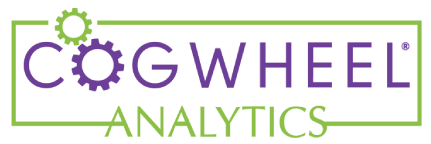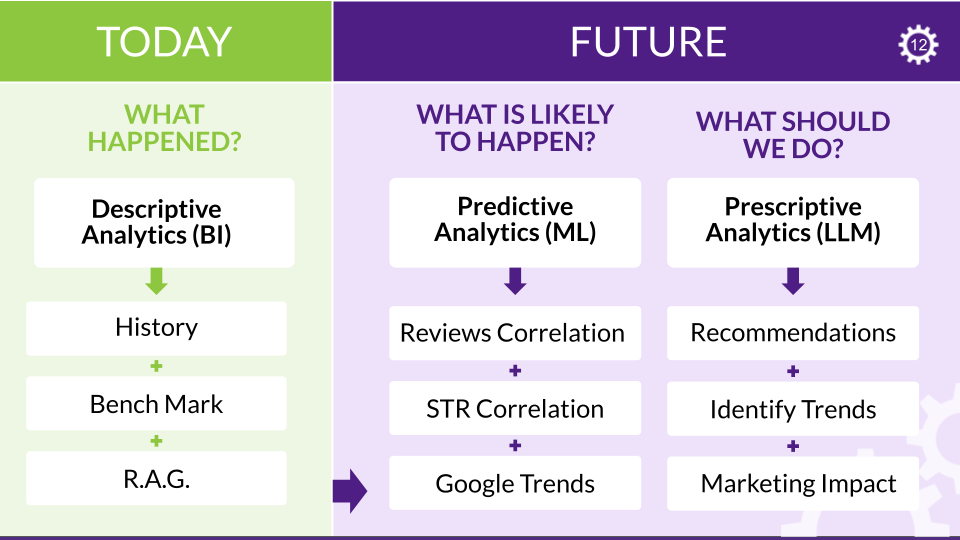There’s no shortage of buzz around AI, and it’s easy to get swept up in the excitement—chatbots, automated reports, predictive pricing, and yes, even those quirky AI-generated photos for a new headshot.
But to make sense of what actually drives value, especially in the hospitality space, it helps to break AI into three buckets: what happened, what will happen, and what to do about it.
Let’s unpack that.
Business Intelligence (BI): What Happened
Most hotels are familiar with business intelligence platforms. The most popular BI report hotels rely upon is the STR report. Many companies now layer on tools like Power BI—a visualization and data-modeling platform—to combine historical commercial strategy data into one view. For marketers, Google Looker Studio (formerly Data Studio) plays a similar role.
These tools tell us what already happened—last month’s occupancy, last month’s spend and click through rates or YoY brand.com contribution.
They’re vital for measuring performance, but they’re inherently backward-looking. They help answer:
- How did our paid search campaign perform?
- What was our conversion rate in Q1?
- Where did we lose share to the comp set?
Cogwheel Analytics consolidates fragmented data so hotel teams can spot trends across channels and benchmark against other hotels. But BI is only the starting point. It’s descriptive and backward-looking. Helpful for learning, but limited for decision-making.
Machine Learning & Predictive Analytics: What Will Likely Happen
Enter the realm of machine learning and predictive analytics. These tools are all about identifying patterns to forecast what’s likely to happen next.
In hospitality, that might look like:
- Forecasting what rate changes a hotel should make in RMS systems
- Understanding correlation of reviews on conversion rates
- Recommending media spend shifts based on historical gaps on the STR report
Machine learning thrives on structured data and repetition. It learns from past inputs to predict future behavior. The upside? You can define correlation, and help understand what did or did not work. The downside? It still relies on historical patterns—meaning it can become ineffective when market dynamics change (hello, 2020).
This is why commercial strategy alignment between sales, marketing and revenue to understand the full picture.. Think: not just “what tactics do I need to activate,” but “how successful were the tactics that I deployed.”
Prescriptive Analytics: What Should We Do?
Now we’re stepping into the future. Most everyone has used a Large Language Models (LLMs), even if they don’t know. Think ChatGPT, Perplexity, and Gemini that help move us from prediction to prescription. Prescriptive analytics goes a step further and recommends the best actions based on goals, constraints, and expected outcomes.
LLMs (like ChatGPT, Perplexity, and Gemini) are often confused with prescriptive analytics, but they are not recommendation engines by themselves. They augment the workflow by turning data into explanations, options, and messaging.
A true prescriptive model requires:
- Structured data (BI feeds, RMS, PMS, CRS, etc.)
- Guardrails to prevent hallucination
- RAG, APIs, or fine-tuning to ground outputs in hotel data
- Optimization logic (not just language generation)
LLMs don’t naturally “read” STR files or GA4 exports—you must connect them through data pipelines and schema-aware prompting.
Once connected, LLMs can support prescriptive work:
- Writing personalized subject lines based on booking behavior
- Recommending copy adjustments for compression nights
- Summarizing marketing and revenue insights into an owner-ready email
So LLMs don’t decide — they translate decisions into human-ready language.
The value here isn’t just automation—it’s augmentation. LLMs can distill layers of data into strategic options. And when integrated with tools like Cogwheel Analytics, they can even propose next best actions for hotel marketers.
Agentic AI: Implementing it All
The next evolution is AI agents—systems that not only recommend but also execute approved actions.
They won’t replace humans, but they will reduce repetitive work, like:
- Auto-pausing PPC when a night is sold out
- Publishing social content based on forecast windows
- Responding to standard guest reviews
Think of agents as the “hands,” not the “brain.”
Types of AI
Too often, hotels invest in tools without understanding their function in the bigger picture. Here’s the cheat sheet:
| Layer / Platform Type | Core Question | Analytics Type | What It Actually Does | Example in Hospitality |
| Business Intelligence (BI) | What happened? | Descriptive | Reports on past performance | STR reports, GA4, dashboards |
| Diagnostic Analytics | Why did it happen? | Diagnostic | Finds drivers, variances & root causes | Why did conversion drop? Which channel lost share? |
| Machine Learning (ML) | What is likely to happen? | Predictive | Forecasts demand, revenue, behavior | ADR forecast, conversion prediction, review sentiment impact |
| Prescriptive Analytics | What should we do? | Prescriptive | Recommends best-fit actions based on goals & constraints | Shift funds from Meta to Google, Increase spend on Expedia |
| Generative AI / LLMs | How do we communicate / operationalize it? | Decision Augmentation | Turns data + recommendations into human-ready content & insights | Writes strategy recaps, generates ad copy |
| Agentic AI (Early Stage) | Can it execute for me? | Automated Actioning | Performs tasks and updates systems based on rules/approval | Schedule social posts, Respond to reviews |
You don’t need to chase the shiniest tool. But you do need to know what questions you’re trying to answer—and which technology best supports that level of insight.
Using variations of all these in hotel marketing to help define and understand success, helps augment strategy and support data driven marketing.
Let’s make smarter hotel marketing decisions.

